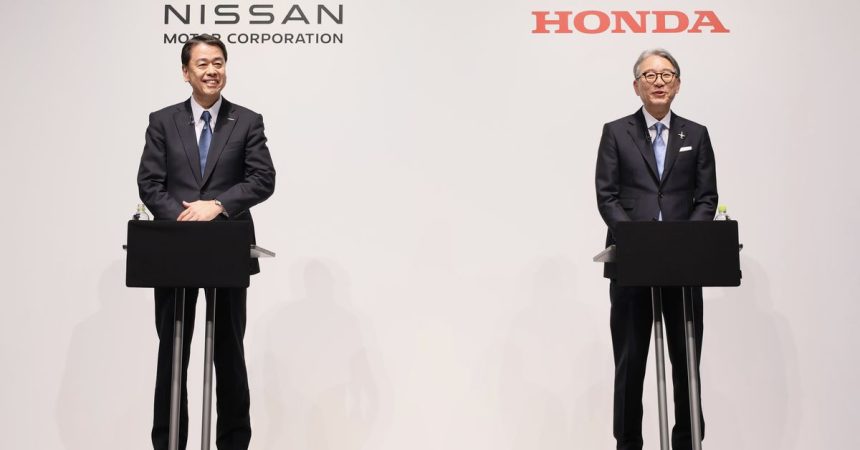The Japanese automotive landscape is on the cusp of a significant transformation as Honda and Nissan, two of the country’s largest automakers, explore a potential merger. Driven by the intensifying competition from electric vehicle giants like Tesla and BYD, and facing declining profitability, particularly for Nissan, the two companies are reportedly in discussions to establish a joint holding company, consolidating their operations under a single entity. This strategic maneuver aims to leverage their combined strengths and resources to accelerate their transition into the rapidly evolving electric vehicle market, where they have been lagging behind global competitors. The potential merger signals a recognition of the challenges faced by traditional automakers in navigating the industry’s shift towards electrification and the need for significant investment and innovation to remain competitive. Discussions are also underway to include Mitsubishi in the proposed alliance, mirroring the consolidation strategy previously seen in the Japanese electronics industry. Such a three-way merger would create a formidable automotive powerhouse, better positioned to compete in the global EV arena.
The urgency of this potential merger is underscored by Nissan’s precarious financial situation. Reports suggest that Nissan’s profitability has plummeted, with net earnings significantly down and the company forced to drastically revise its operating profit forecast downwards. This financial vulnerability adds weight to the potential benefits of a merger with Honda, providing Nissan with much-needed financial stability and access to Honda’s technological advancements, particularly in the EV sector. Honda, while in a relatively stronger position, would gain from increased scale and market share, solidifying its position in the global automotive market. Both companies have acknowledged ongoing discussions regarding collaboration, emphasizing the exploration of various possibilities to capitalize on each other’s strengths and navigate the transformative period in the automotive industry.
The electric vehicle market, while experiencing a slight slowdown in global growth, remains highly competitive, with Chinese manufacturers like BYD and Tesla rapidly expanding their market share. This dynamic has placed significant pressure on traditional automakers, particularly Japanese brands, who have been struggling to keep pace with the innovation and aggressive market penetration of their Chinese rivals. Japanese automakers are particularly feeling the pressure in key Asian markets, losing significant ground to Chinese brands in regions like Southeast Asia and even within their traditional stronghold in East Asia. This erosion of market share highlights the need for Japanese automakers to adapt quickly and invest heavily in electric vehicle technology to regain their competitive edge.
Honda’s upcoming launch of its new EV platform, Honda Zero, signifies a renewed focus on electric vehicles, coupled with the relative success of its GM-based electric Prologue SUV in the US market. These developments indicate Honda’s commitment to embracing the electric future and its strategic positioning to capitalize on the growing demand for EVs. In contrast, Nissan, despite its early lead in the EV market with the 2011 Leaf, has struggled to maintain momentum, lagging behind competitors in terms of new EV models and technological innovation. The Ariya, Nissan’s second major foray into the EV market, has yet to achieve the same level of market penetration as its competitors, further highlighting the need for strategic partnerships and increased investment in EV research and development.
The potential merger between Honda and Nissan, and the possible inclusion of Mitsubishi, represents a significant strategic shift in the Japanese automotive industry. Faced with intensifying competition from Chinese EV manufacturers and the imperative to transition towards sustainable mobility, these Japanese automakers are exploring collaborative solutions to strengthen their position in the rapidly evolving global market. By pooling their resources, expertise, and technological advancements, they aim to achieve economies of scale, accelerate EV development, and recapture lost market share. This strategic alliance holds the potential to reshape the Japanese automotive landscape and position them more competitively in the era of electric vehicles. The outcome of these discussions will have significant ramifications for the future of these companies and the broader automotive industry.
The success of this potential merger hinges on the ability of Honda and Nissan to effectively integrate their operations and leverage their combined strengths to develop and market competitive electric vehicles. This requires a clear strategic vision, efficient resource allocation, and a commitment to innovation. Furthermore, the inclusion of Mitsubishi adds another layer of complexity to the merger, requiring careful coordination and integration of the three companies’ distinct cultures and operational structures. The combined entity will need to navigate the challenges of cultural differences, potential redundancies, and differing technological approaches to achieve synergy and maximize the benefits of the merger. Ultimately, the success of this alliance will depend on their ability to respond effectively to the evolving demands of the electric vehicle market and regain their competitive edge in the face of fierce global competition.



